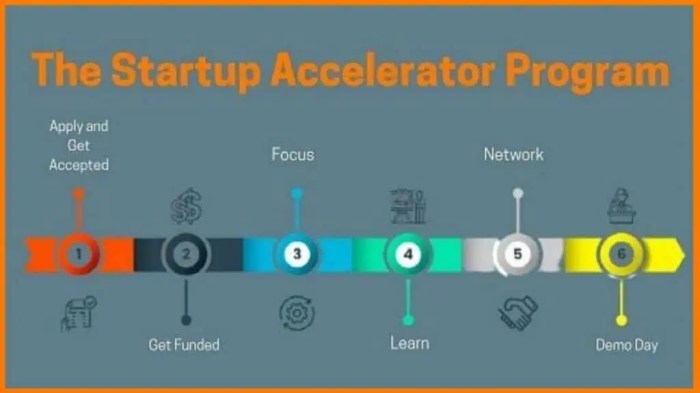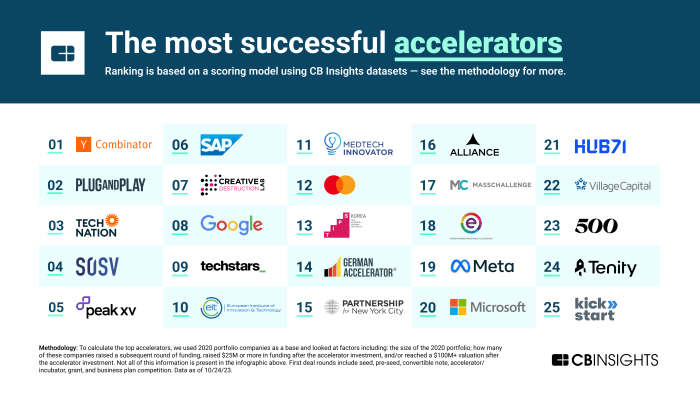Unlocking Growth: Exploring the World of Startup Accelerators
As startup accelerator takes center stage, this opening passage beckons readers into a world crafted with good knowledge, ensuring a reading experience that is both absorbing and distinctly original.
Startup accelerators play a pivotal role in nurturing and propelling early-stage startups towards success by providing a structured program filled with mentorship, funding opportunities, and invaluable networking. Let's delve into the realm of startup accelerators and uncover the secrets behind their transformative impact on budding businesses.
Definition of a Startup Accelerator
Startup accelerators are fixed-term, cohort-based programs that include mentorship and educational components to help early-stage companies grow and scale quickly. The primary purpose of a startup accelerator is to provide entrepreneurs with the resources, guidance, and network needed to accelerate the growth of their startups.
Examples of Well-Known Startup Accelerators
- Y Combinator: Based in Silicon Valley, Y Combinator is one of the most prestigious startup accelerators in the world, known for launching successful companies like Airbnb and Dropbox.
- Techstars: With programs in various cities around the globe, Techstars offers mentorship and funding to startups in industries ranging from technology to healthcare.
- 500 Startups: Operating globally, 500 Startups has supported hundreds of companies through its accelerator program, focusing on early-stage investments and growth.
Typical Structure and Format of a Startup Accelerator Program
Startup accelerator programs usually last for a few months and consist of intensive mentoring, workshops, networking opportunities, and sometimes seed funding in exchange for equity. Startups go through a structured curriculum designed to help them validate their business models, acquire customers, and prepare for further investment.
At the end of the program, startups often pitch their businesses to a room full of investors during a demo day to secure additional funding and partnerships.
Benefits of Joining a Startup Accelerator
Joining a startup accelerator can provide numerous benefits for early-stage companies looking to grow and succeed in the competitive business landscape. From mentorship to funding opportunities, participating in an accelerator program can significantly boost a startup's chances of success.
Access to Mentorship and Guidance
Startup accelerators often provide access to experienced mentors who can offer valuable guidance and advice to founders. These mentors share their expertise, help startups navigate challenges, and provide insights that can accelerate growth and development.
Networking Opportunities
One of the key benefits of joining a startup accelerator is the opportunity to network with other entrepreneurs, investors, and industry experts. Building a strong network can open doors to potential partnerships, collaborations, and investment opportunities that can drive the startup's growth.
Seed Funding and Investment
Accelerator programs typically offer seed funding in exchange for equity, providing startups with the initial capital they need to fuel their growth. Additionally, accelerators often connect startups with investors, increasing their chances of securing further funding to scale their business.
Structured Curriculum and Resources
Startup accelerators provide a structured curriculum that covers various aspects of building a successful business, including marketing, product development, and fundraising. Startups also have access to resources such as workshops, seminars, and tools to help them refine their business model and strategy.
Success Stories
Numerous startups have flourished after going through accelerator programs. For example, Airbnb participated in the Y Combinator accelerator and went on to become a global hospitality giant. Another success story is Dropbox, which also graduated from Y Combinator and grew into a widely-used cloud storage platform.
These success stories highlight the transformative impact that joining a startup accelerator can have on a company's growth and success.
Application Process for Startup Accelerators

Applying to a startup accelerator can be a crucial step for the growth and success of your startup. Understanding the typical steps involved and knowing what criteria accelerators look for in potential candidates can greatly increase your chances of being accepted into a program.
Typical Steps in Applying to a Startup Accelerator
When applying to a startup accelerator, the process generally involves the following steps:
- Research: Understand the different accelerators available and find the ones that align with your startup's goals and industry.
- Application: Fill out the application form provided by the accelerator, which may include questions about your team, product, market, and business model.
- Selection: The accelerator will review the applications and select startups that show promise and potential for growth.
- Interview: Shortlisted candidates may be called for an interview to further assess their suitability for the program.
- Acceptance: Successful candidates will receive an offer to join the accelerator program.
Criteria Accelerators Look for in Potential Startup Candidates
Accelerators typically look for certain criteria when evaluating potential startup candidates:
- Team: A strong and cohesive team with complementary skills and a clear vision for the startup.
- Product/Market Fit: Evidence of a product or service that solves a real problem in the market.
- Scalability: Potential for rapid growth and scalability of the startup.
- Coachability: Willingness to learn, adapt, and receive feedback to improve the startup.
Tips for Startups to Increase Their Chances of Being Accepted
Here are some tips to enhance your chances of being accepted into a startup accelerator:
- Refine Your Pitch: Clearly articulate your value proposition, target market, and competitive advantage in your application.
- Build a Strong Team: Showcase a diverse team with relevant skills and experiences that can drive the startup forward.
- Demonstrate Traction: Provide evidence of customer validation, revenue growth, or product development milestones achieved.
- Network: Attend events, connect with alumni, and engage with the accelerator to increase visibility and credibility.
Mentorship and Networking Opportunities
Mentorship and networking opportunities play a crucial role in the success of startups participating in accelerator programs. These aspects not only provide valuable guidance and support but also open doors to potential collaborations and partnerships within the startup ecosystem.
Role of Mentorship
Mentorship is a cornerstone of startup accelerators, offering founders access to experienced entrepreneurs, industry experts, and investors who provide valuable insights, feedback, and guidance. Mentors help startups navigate challenges, refine their strategies, and make crucial connections that can significantly impact their growth and success.
- Provide valuable industry insights and expertise
- Offer guidance on strategy and decision-making
- Help navigate challenges and obstacles
- Assist in making crucial connections with investors and potential partners
Networking Opportunities
Startup accelerators create a conducive environment for startups to network with fellow founders, mentors, investors, and other key players in the startup ecosystem. These networking opportunities can lead to potential collaborations, partnerships, and investments that can propel the growth of startups and open up new avenues for expansion.
- Connect with like-minded founders for knowledge sharing and collaboration
- Build relationships with potential investors for funding opportunities
- Access a wider network of industry experts and professionals
- Attend events, workshops, and conferences to expand your reach and visibility
Importance of Building Connections
Building connections within the startup ecosystem during the accelerator program is essential for long-term success. These connections can lead to strategic partnerships, customer acquisitions, and valuable feedback that can shape the direction of the startup. By actively engaging with mentors and fellow founders, startups can leverage the power of networking to accelerate their growth and achieve their goals.
Funding and Investment Aspects
Startup accelerators play a crucial role in providing funding and investment opportunities to startups, helping them scale and grow their businesses faster. Let's delve into how accelerators typically support startups in terms of funding and investment.
Types of Investment Models
Accelerators offer various investment models to their portfolio companies, including:
- Equity Investment: Accelerators usually take an equity stake in the startup in exchange for funding and support. This model aligns the interests of both parties, as the accelerator benefits from the startup's growth and success.
- Convertible Notes: Some accelerators may offer convertible notes, which are loans that can convert into equity at a later stage, typically during a future funding round. This provides flexibility to both the accelerator and the startup.
- SAFE (Simple Agreement for Future Equity): Another common investment model is SAFE, which allows accelerators to invest in startups with the promise of receiving equity in the future at a predetermined valuation cap. This model is popular for its simplicity and investor-friendly terms.
Leveraging Funding for Growth
Startups can leverage the funding received from accelerators in several ways to fuel their growth and scalability:
- Product Development: Startups can allocate funds towards developing and improving their products or services, enhancing their value proposition and competitiveness in the market.
- Marketing and Sales: Funding can be used to boost marketing and sales efforts, reaching a wider audience and acquiring more customers to drive revenue growth.
- Talent Acquisition: Startups can invest in hiring top talent to strengthen their team and capabilities, accelerating innovation and execution.
- Expansion and Scaling: With the financial support from accelerators, startups can expand into new markets, scale their operations, and seize growth opportunities swiftly.
Wrap-Up

In conclusion, startup accelerators serve as catalysts for innovation and growth, offering a unique blend of resources and support that can significantly enhance a startup's trajectory. As we've explored the various facets of startup accelerators, it's evident that these programs have become indispensable for entrepreneurs looking to navigate the competitive landscape with confidence and strategic guidance.
FAQ Summary
What sets startup accelerators apart from other entrepreneurial programs?
Startup accelerators offer a focused and intensive program with a time-limited cohort structure, providing startups with mentorship, funding, and networking opportunities to accelerate their growth.
How do startups benefit from joining a startup accelerator?
Startups benefit from access to mentorship, funding, networking, and a structured program that helps them refine their business model, scale more rapidly, and gain valuable industry insights.
What criteria do startup accelerators look for in potential candidates?
Accelerators typically seek startups with innovative ideas, a strong team, scalability potential, coachability, and a clear market fit to ensure the best chances of success.




